The last two years Dr. Florian Schütte was a postdoctoral researcher in the EUREC4A-OA project under Prof. Dr. Jin-Song von Storch at the Max Planck Institute for Meteorology in Hamburg. He studied ocean-atmosphere interactions in the western tropical Atlantic on short time scales (diurnal and smaller) and compared observations with the coupled Earth system model ICON, as well as different model configurations of ICON. The heat and energy distribution in the upper ocean is largely determined by the diurnal cycle and atmospheric factors such as the wind. One result of Dr. Florian Schütte's work, however, was that oceanic structures such as large eddies can influence the exchange with the atmosphere. The interface between the atmosphere and the ocean is an important component of the Earth system that is both difficult to capture with observations and still subject to error in models. That is why basic research in this area is of enormous importance.
At GEOMAR, he will focus on physical observations of small-scale ocean structures. Especially here, an intensive coupling between physical, biogeochemical and biological processes can be observed, which requires strong interdisciplinary work — which is also mandatory to understand the Earth system holistically. These small-scale ocean structures (such as fronts or eddies) are found throughout the world's oceans. In particular, however, Dr. Florian Schütte will focus on the eastern tropical Atlantic around the upwelling areas of Mauritania/Senegal, as well as the Cap Verdian Archipelago with adjacent seamounts.
Florian Schütte: “If you look at individual small-scale processes in the ocean, it is always impressive to see how the many components of the ocean are locally intertwined. Physics sets a framework, for example in the form of an eddy, to which biogeochemical processes respond. These in turn influence biology from small zooplankton to larger predators to humans. I would like to focus on these interdisciplinary aspects during my junior professorship. I am looking forward to the new challenges.”
Contact:
Dr. Florian Schütte
Email: fschuette@geomar.de

